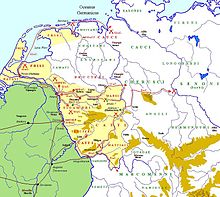Battle of Arbalo
| Battle of Arbalo | |||||||
|---|---|---|---|---|---|---|---|
| Part of the Early Imperial campaigns in Germania | |||||||
 Campaigns of Drusus | |||||||
| |||||||
| Belligerents | |||||||
|
| Germanics | ||||||
| Commanders and leaders | |||||||
| Nero Claudius Drusus | unknown, possibly Segimer | ||||||
| Casualties and losses | |||||||
| unknown | unknown | ||||||
The Battle of Arbalo was a fight between the Romans and the Germanii in 11 B.C. It was part of the Drusus Campaigns (12 to 8 B.C.)
As part of operations by Augustus to secure the borders of the Roman Empire, Drusus, military commander and stepson of Augustus, was given the order to pacify the region on either side of the River Rhine. In spring 11 B. C. he crossed the Rhine with his army and defeated the Usipetes. He built a bridge over the Lippe and marched through the territory of the Sugambri and the Cherusci to the Weser.
During its return march to the Rhine the army was lured into an ambush at a place called Arbalo.[1] It was attacked in a narrow pass by Cherusci.[2]
Using the element of surprise and their advantageous position, the Germans were winning until they decided to retreat for some time, allowing the Romans to break through the force defending one of the exits and escape.[2]
Arbalo is thought to be near modern-day Hameln or Hildesheim.[2]
References
- ^ Titus Livius, periocha 140: Cherusci Tencteri Chauci aliaeque Germanorum trans Rhenum gentes subactae a Druso referuntur.
- ^ a b c Powell, Lindsay (2013). Eager for glory : the untold story of Drusus the Elder, Conqueror of Germania (1 ed.). Barnsley: Pen & Sword Books Ltd. pp. Chapter 5: “Drusus the commander”, Section “Ambush at Arbalo”. ISBN 978-1-78303-003-3. OCLC 835973451.
Sources
- Pliny the Elder: Naturalis historia 11, 28, 55
- Cassius Dio: Historia Romana, 54, 32–33 & 36,3; 55, 1–2,3
